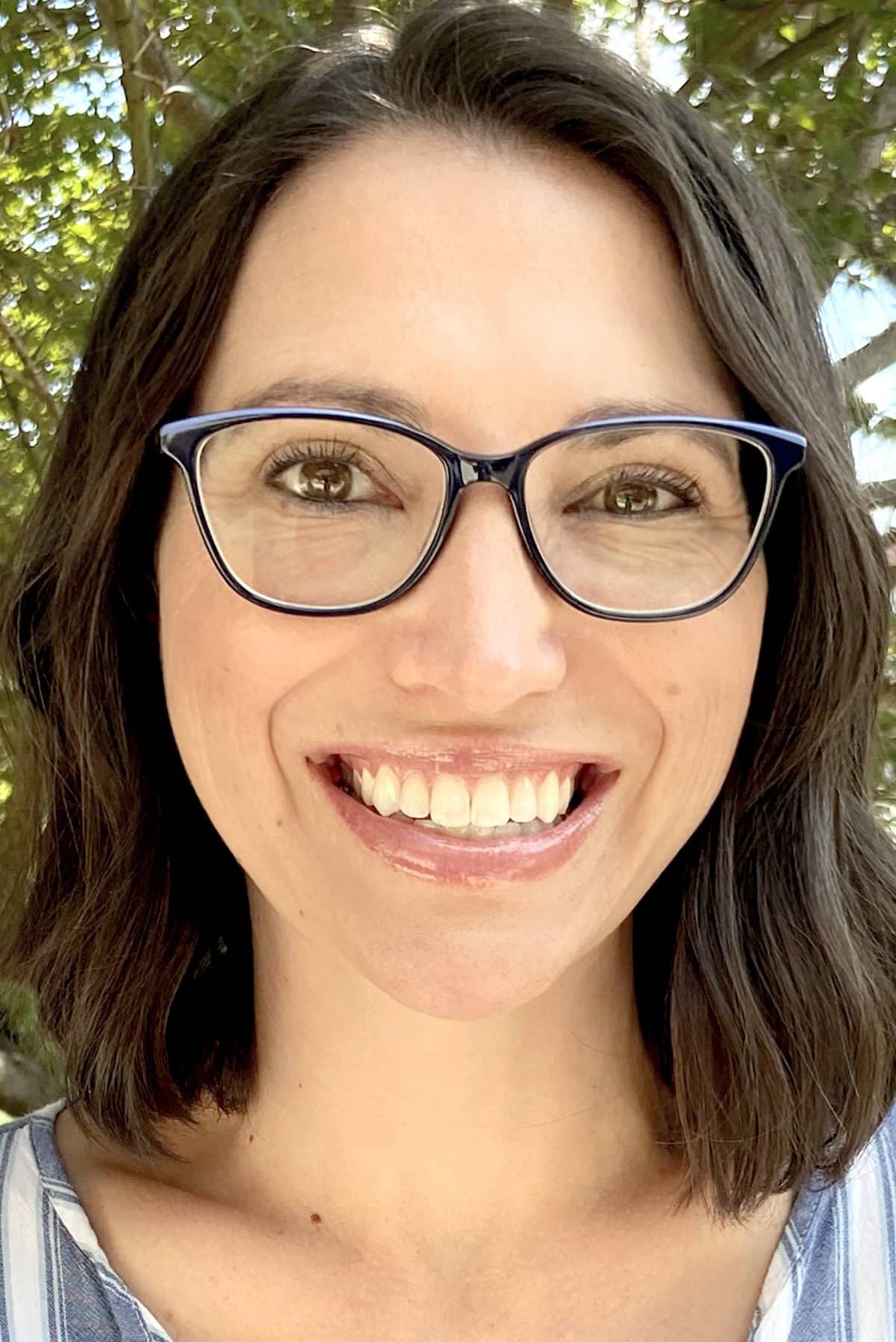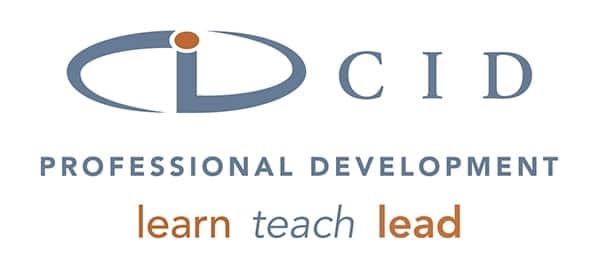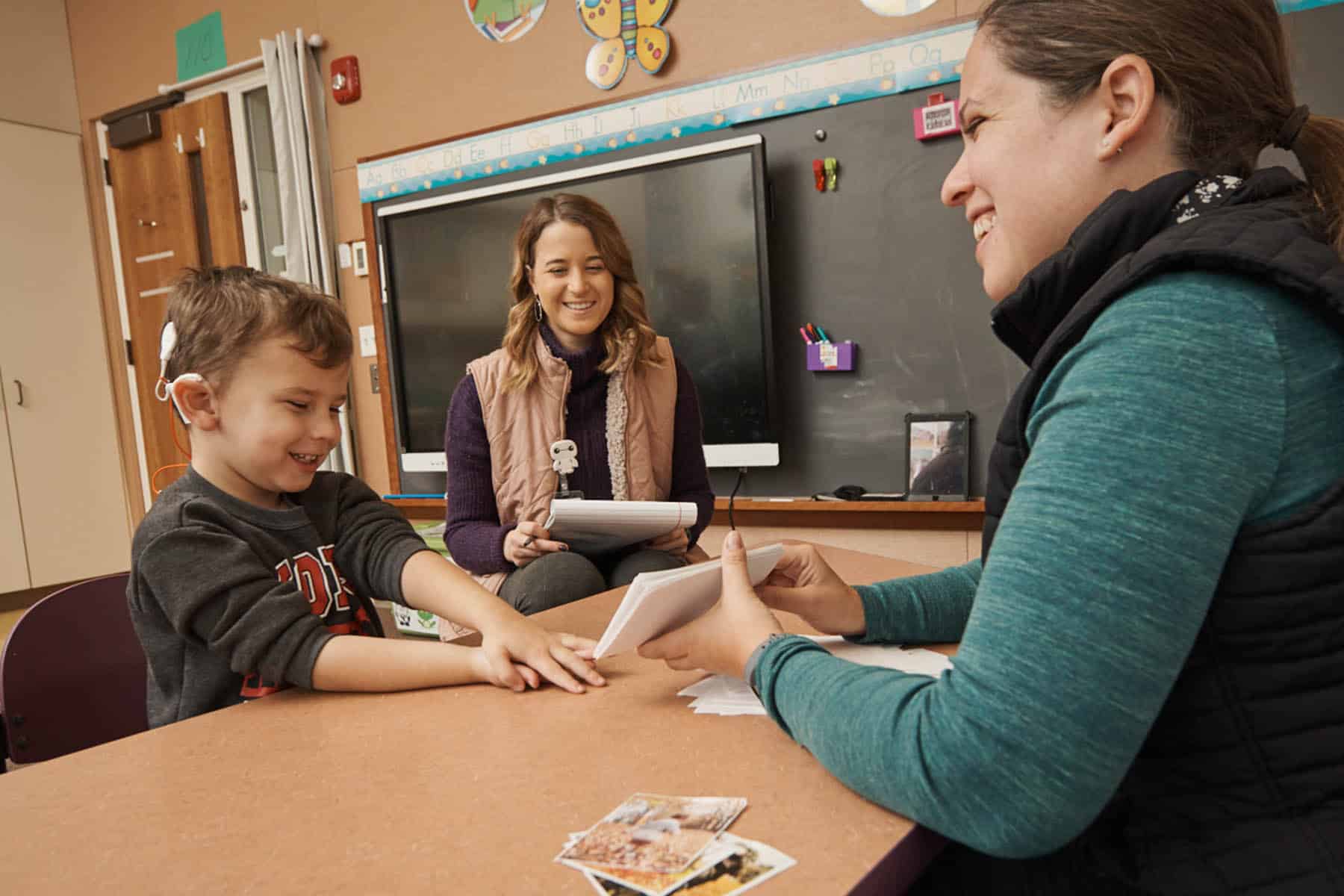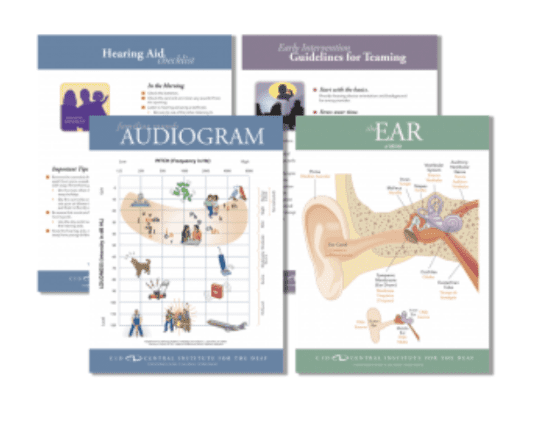In the field of education, many assumed roles have changed in recent years. Amongst the changes, one truth remains, to effectively serve students, educators need to engage in team collaboration. We asked a variety of professionals how they collaborate with others to best meet the needs of children who are deaf and hard of hearing.
Question: What do you see as your specific role(s) in serving a student with hearing loss?
- Support in the school building for device or other hearing issues. His case manager is the hearing itinerant and is at the school once a week. -SLP
- To provide educational support to improve their listening access within their learning environment. To empower them and their care team to feel as though they have an understanding of the technology to be able to advocate for themselves to have the best access to sound. –AuD
- In-servicing staff members who work with the students on how their hearing loss can impact them across different environments, as well as how their hearing assistive technology works. Troubleshooting equipment (DMs, hearing aids, cochlear implants, BAHAs). Providing support to the student, their family, and other members of the IEP team to ensure they have the individualized support they need to succeed in educational settings. –Itinerant ToD
- As a co-teacher in a STEM and Social Studies general education classroom, my role is to help that student fully understand the curriculum with accommodations. I also work closely with their hearing itinerant to help create academic goals. –Sp Ed
- In addition to teaching the curriculum and assuring the student has the accommodations needed to be successful, I collaborate with the district resources and am responsible for maintaining the Roger device and making sure it’s working properly. –Gen Ed
- Address the outcomes in the IFSP while working with the team. –EI
- When I am serving a child with hearing loss (and vision) and because all of the children I see have vision loss, I always love to incorporate all of their senses- hearing, touch, sight, smell, and taste. I think it’s important to teach families about how the importance of narrating their child’s day. During diaper changes, during play, during bath time and meal times… So, really being intentional and really explaining what’s going to happen before it happens. –EI & Vision Specialist
Question: With whom, and how, do you collaborate when serving a student with hearing loss?
- Teachers, parents, other services providers -SLP
- TOD/HH, speech pathologist, special education teachers, occupational therapists, classroom teachers, assistant principals, school nurses, personal nurses, paraprofessionals, directors of student services. –AuD
- Audiologists, Speech Language Pathologists, General Education Classroom Teachers, Special Education Teachers, School Psychologists, School Nurses, Other Teachers of the Deaf/Hard of Hearing! –Itinerant ToD
- I collaborate with the general education teacher, the hearing itinerant, and their case manager (if I am not the case manager). We meet and discuss the student’s progress, their goals, and how they are doing in class. We review data and assessments to determine if the student is on track to meeting their goals. –Sp Ed
- I collaborate with specialist teachers, lunchroom aides, the Itinerant Teacher for the Deaf/Hearing Impaired, and the Educational Audiologist. –Gen Ed
- Early Intervention Teacher of the Deaf (EI-ToD) –EI
- I have worked with Early Intervention Teachers of the Deaf (EI-ToD). So usually, I will talk to the parent educator for the child and see what they have been working on hearing-wise and then they will ask what vision modifications we have been working on and then we collaborate to find the best way to support the child’s needs. –EI & Vision Specialist
Please share some challenges and successes with these collaborations.
- Coordinating care between the district level contacts (directors of student services/special education) and the direct care providers/case managers usually results in many lapses in communication, which, can delay the interventions a student needs. –AuD
- Making sure people understand that hearing assistive technology (DMs, hearing aids, cochlear implants) aren’t a magic fix, that these students still need accommodations, modifications, and other supports to ensure they have equitable access to their environments! Successes: Constantly learning different perspectives and figuring out new goals/strategies to promote a student’s success! –Itinerant ToD
- Sometimes it is difficult to meet with everybody at once. The hearing itinerant travels to different schools, so she is not at the school every day. Some successes are working together to help that student feel confident with a hearing device or hearing aid in the classroom. –Sp Ed
- Using the Roger can be a challenge at times. Sometimes, it does not connect or we need to troubleshoot connection issues. Since we do not have an educational audiologist in the building, we have to wait for assistance/communication. One of the successes we’ve had is the way peers step in to help when needed, making sure the student can hear or understand the directions. –Gen Ed
- I’ve never had any challenges. Success is that the family is on board and has a clear understanding of strategies and can use those strategies. –EI
- EI-ToD and I had a really challenging family together… The successes have been when I was working with an EI-ToD and we could collaborate how we would incorporate vision and hearing and we saw carry-over on the families’ part. –EI & Vision Specialist
Effective teamwork and communication among everyone on the educational team will aid in serving a child with hearing loss more fully.
To gain more insight from these professionals, read Roles: Yours, Mine and Ours, Roles and Services and Roles and Rewards.
Thank you to following for contributing their time and expertise:
- Susan Peroutka, Speech-Language Pathologist (SLP), Missouri
- Emily Love Leserman, Pediatric/Educational Audiologist (AuD), Connecticut
- Katie Zawislak, Itinerant Teacher of the Deaf and Hard of Hearing (ToD), Minnesota
- Laura Weil, Special Education Teacher (Sp Ed), Illinois
- Cindy Beyer, General Education Teacher (Gen Ed), Illinois
- Tammy Wrobbel, Early Interventionist* (EI), Illinois
- Chantille Schram, Early Interventionist* (EI) & Vision Specialist, Illinois and Missouri

Abby Meister, MSDE, CED is the Content Coordinator of the Emerson Center for Professional Development at CID – Central Institute for the Deaf. She has been a teacher of the deaf for over 10 years, primarily working with children ages 2-5. She has presented at professional conferences with content focusing on early intervention and listening and spoken language strategies for children who are deaf or hard of hearing. She received her master’s degree in deaf education through the Program in Audiology and Communication Sciences (PACS) at Washington University.












